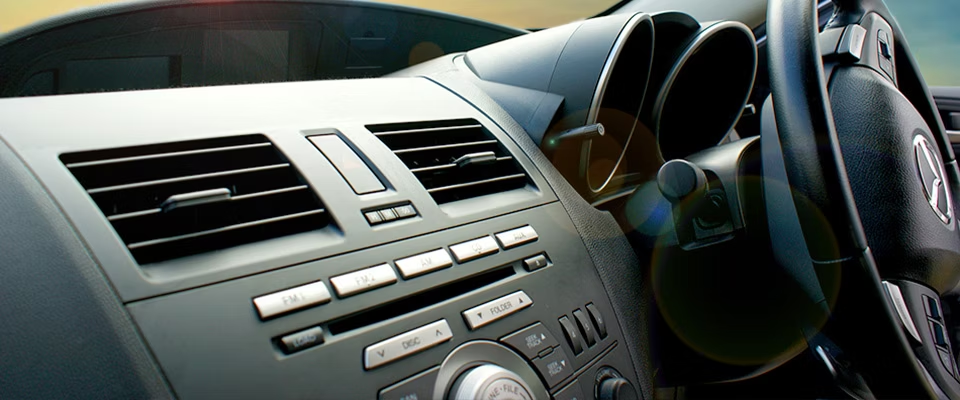
Is your family taxi — family toxic?
Is your car could be making you and your family feel sick, tired, stressed out and irritable?
Read moreLike just about any modern technology with moving parts, the air-conditioning system in your car needs to get a regular service to maintain peak efficiency.
The car air conditioner's compressor needs to have the oil checked and/or changed to prevent it from seizing up. When the air filters become clogged with dirt and bacteria it will affect the performance of the entire system and it can even cause automotive air conditioners to quit working altogether - not to mention the ill effect it can have on your health.
It's also very important that the rubber seals are checked for any leaks or deterioration. When car air conditioner seals start to leak gas your air conditioner system as a whole will begin to deteriorate, decreasing it's efficiency and increasing your use of fuel. A new car can typically lose approximately 20% of it's refrigerant gas in the first two years.
The special Refrigerant gas in a car air conditioning system is what creates ‘the cool'. This gas is compressed via the compressor, causing it's temperature to drop, then it is pumped through the system to cool the air which is to be circulated through your car. Running your air conditioner puts en extra load on the engine which means you need to consume more fuel than you normally would.
When the refrigerant gas has started to leak or evaporate there is a drop in pressure so the compressor has to work harder to compress the gas and this in turn puts a bigger load on your car's engine, meaning of course that you are using even more fuel. This pressure drop also occurs naturally over time as the gas degrades.
To run in top condition the refrigerant gas in your car air conditioner needs to be recharged completely within four years from the manufacture date and every two to three years after that to ensure the optimum pressure level is maintained.
By getting an annual car air-conditioning service you can help to prevent costly breakdowns in the future - and a well serviced air-conditioning actually saves you money because it uses less petrol and potential problem may be identified early and avoided.
Allpoint Automotive care about the environment to conduct automotive air conditioning service reliably and responsibly. ARC Approved Car Air Conditioning Servicing reduces Fuel Costs and protects your health.
Ask about our MIST service today and treat the problem at it's source. A mist service will kill any bacteria that may be lurking in your car's air system. This bacteria can cause odours and even make you sick, especially if you have allergies or asthma.
A MIST clean of your system uses ultra sonic technology to ensure that your car's air con system is clean and free of nasty bugs - making your car not just smell better but making it healthier for you and your family.
Book your car air conditioning service with the professionals at Allpoint Automotive in Tullamarine today!

How do air conditioners work?
A car air conditioner system is composed of four essential parts :
Car air conditioning is designed to pull the heat from the air within the car's interior area and transfer it outside, leaving only cooled or 'conditioned' air to be redistributed. Hot air is passed across a gas-filled evaporator, where the heat is easily absorbed by the refrigerant (in gas form), effectively removing the heat from the air in the car.
The now heated gas is pulled through the compressor where it is further heated (via compression). The next stage involves the refrigerant being forced through the condenser to extract the refrigerant's heat quickly. The refrigerant, now condensed to a liquid, then moves through the expansion device (either a TXV or Orifice tube), which regulates the refrigerant's flow to the evaporator, changing the high-pressure liquid to a low-pressure mist (gas). A fan blowing over the evaporator's cold fins produces the cold air being blown into the car, and the entire process then begins all over again.
Does the car air conditioner use more fuel?
Yes! Your car air conditioning is using fuel. However, it's actually more fuel efficient to run car air conditioning than it is to have your windows down due to aerodynamic drag. If your air conditioning isn't performing its best, it may use more fuel to run. To avoid this, it's important that you have your air conditioning serviced regularly by professionals, like the ones at Allpoint Automotive.
What's the cause of the bad smell in car air conditioning?
The damp environment can promote microbes, bacteria and even fungus growth inside the evaporator core. This can lead to nasty smells and possibly even be bad for the health of any vehicle occupants. Although modern evaporator units tend to be more efficient, they have more fins, meaning an increased capability to trap moisture and allow for micro-organism development.
How do I know my car air conditioning is due for a service?
If you cannot remember when your air conditioning was last serviced, perhaps it's time to book in with the team at Allpoint Automotive. You should also book in if:
Why does the car air conditioner need to be serviced?
Car air conditioning is designed to pull the heat from the air within the interior area of the car outside, leaving only cooled or 'conditioned' air to be redistributed. This is achieved using a special compound called refrigerant, capable of readily absorbing heat as a gas and quickly losing heat as a liquid.
The compressor needs the right amount of oil in the refrigerant to prevent it from seizing up. Should the air filters be jammed with dirt and bacteria, it will affect the entire system's performance, and it can even cause it to stop working altogether. On top of inhibiting air conditioner efficiency, dirty air filters can cause health problems.
Being exposed to the elements and very diverse operating conditions and being used intermittently rather than being 'Always On' can cause decay of the hoses, connections and seals. A vehicle air conditioning system should be examined regularly to ensure there are no problems or refrigerant loss due to failure or leakage from these points.
Simply by cooling the air in your car under normal running conditions, the air filters get dirty and intermittent use can cause seals to dry and crack, allowing them to leak. Even without leaks, the gas in a car air conditioning system will eventually begin to degrade or evaporate over time. It should be recharged as required to keep the air con system in peak running condition.
How often should a car air conditioner be serviced?
Your automotive air conditioning system needs to be examined once a year for any signs of problems with the seals, hoses and connections and confirm there is no refrigerant reduction over time. Regularly servicing your automotive air conditioner system keeps refrigerant at optimum levels meaning the system does not need to work as hard. This, in turn, protects the system from damage and minimises fuel expenditure.
Can I service my own car air conditioner?
Only qualified mechanics with the appropriate training, like the ones at Allpoint Automotive, should attempt to service a car air conditioner. Specific licences are required to service or repair some types of car air conditioning systems, especially where re-gas (recharging of the refrigerant) is concerned. Strict guidelines and procedures must be adhered to when handling certain refrigerants, which must always be fully recovered and not allowed to escape into the atmosphere during servicing.
Refrigerant can also pose serious health risks if mishandled. Specialist equipment is also required as the air conditioning system is under extreme pressure and must be pulled into a deep vacuum to remove any moisture, to avoid seriously damaging the system. You can find out more about licensing on the Australian Refrigeration Council (ARC) Website.

Is your car could be making you and your family feel sick, tired, stressed out and irritable?
Read more
As your local Mechanic in Tullamarine, Victoria, Allpoint Automotive take great pride in offering clients the very best in car servicing and automotive repairs.
Read more